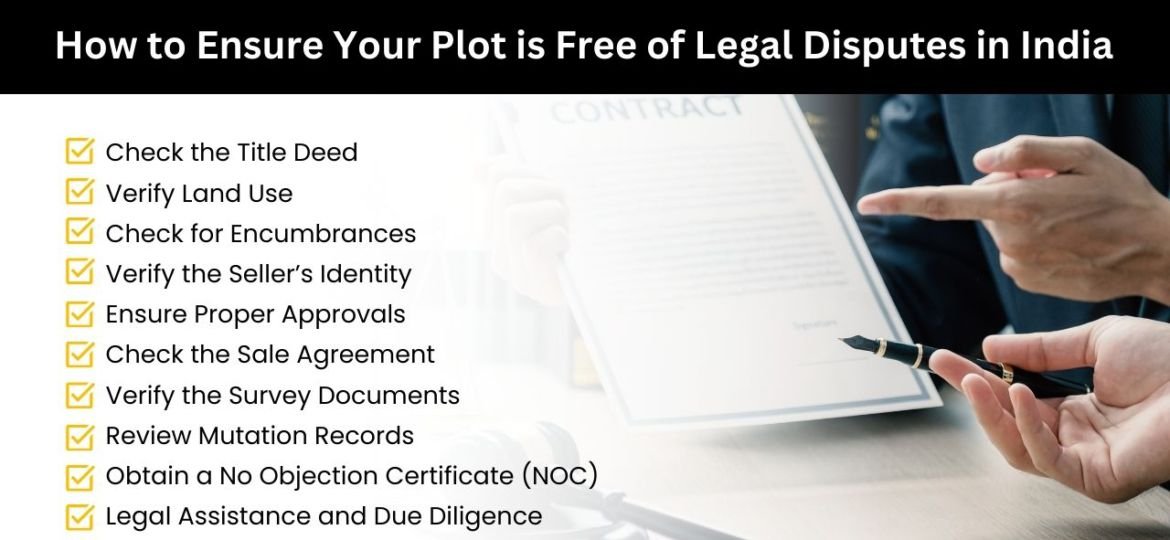
How to Ensure Your Plot is Free of Legal Disputes in India
Buying land in India is often seen as a valuable long-term investment, but it comes with its share of legal challenges. Whether you’re purchasing for residential purposes, commercial use, or future returns, it’s vital to ensure the land is legally clear. Unresolved ownership disputes can lead to lengthy litigation and even loss of property.
This blog outlines the key legal checks you must perform before making a land purchase, helping you avoid unnecessary hassles and protect your investment. While exploring residential plots for sale in Udaipur, conducting these verifications becomes even more important to ensure a smooth and secure transaction.
1. Check the Title Deed
The title deed is the most crucial document when purchasing land, as it establishes the seller’s legal ownership of the property. It must be clear of any legal complications or encumbrances.
If you’re exploring residential plots for sale in Udaipur, start by verifying that the title deed complies with the city’s residential zoning regulations. This ensures the land is legally approved for residential use and free from urban planning violations.
Ensure the title deed is in the name of the seller.
Confirm that the title deed is registered in the seller’s name.
Ensure the land is not mortgaged, disputed, or under litigation.
Cross-check the details with the local land records office to validate ownership and plot boundaries.
2. Verify Land Use
The next crucial step is to verify the designated land use of the plot. Not all land is meant for residential or commercial use; some may be agricultural or industrial. The zoning regulations set by the local development authority determine what the land can legally be used for. Make sure:
- The land is designated for the purpose you intend to use it for, whether residential, commercial, or industrial.
- The property has been converted for the correct use, especially if it was previously agricultural land.
3. Check for Encumbrances
An encumbrance certificate is essential to prove that the property is free from any legal or financial liabilities such as loans or mortgages. You can obtain this certificate from the Sub-Registrar’s office for the last 12 to 30 years, depending on the situation. The encumbrance certificate should show:
- No outstanding debts or legal claims against the property.
- No mortgages or legal hurdles that could affect your ownership.
4. Verify the Seller’s Identity
Before entering into any transaction, it’s vital to verify the identity of the seller. Fraudulent sellers might claim ownership of land they don’t actually own. To prevent this:
- Ask for valid ID proof, such as an Aadhaar card or PAN card.
- Ensure that the seller has the legal right to sell the property, especially in cases of inherited land or joint ownership.
5. Ensure Proper Approvals
When buying a plot, it’s important to check that all necessary approvals from the local authorities are in place. This is especially important when buying from developers. Verify the following:
- Development Approvals: The layout plan should be approved by the local development authority.
- Building Permissions: Ensure that the developer or seller has the required building permits and permissions.
- Clearance from Authorities: Check for approvals from environmental and civic authorities, especially in cases of large-scale development projects.
6. Check the Sale Agreement
Before making the final purchase, carefully review the sale agreement. This legal document outlines the terms and conditions of the sale, including the price, payment schedule, and other responsibilities of both parties. Make sure the agreement includes:
- Details about the plot, including dimensions and boundaries.
- The total price, advance payment, and balance amount.
- Clear mention of any penalties in case of a default by either party.
It’s also recommended to consult a legal expert to ensure the terms are in your best interest.
7. Verify the Survey Documents
A proper land survey ensures that the boundaries of your plot are well-defined and free from any overlapping issues with adjacent properties. Disputed boundaries can lead to conflicts with neighbors or local authorities. The following documents should be cross-checked:
- Survey Plan: Make sure the plot has been accurately surveyed by the local land survey office.
- FMB (Field Measurement Book): This document, issued by the local authority, ensures that the plot’s boundaries match the legal description in the title deed.

8. Review Mutation Records
Mutation is the process of updating the land ownership records with the local municipal or revenue office. After purchasing the plot, it’s important to get the mutation completed in your name to establish legal ownership. Check:
- The seller’s mutation record to ensure they are the rightful owner.
- Your name is added to the municipal records after the sale.
Without mutation, property tax receipts and other legal documents may still be issued in the previous owner’s name, potentially leading to legal complications.
9. Obtain a No Objection Certificate (NOC)
In many cases, especially when purchasing land from a developer or under-construction project, you need to ensure that the seller has obtained a No Objection Certificate (NOC) from the local authorities. This certificate verifies that the plot is free of any legal disputes and that the seller has no objections from civic bodies or local governing authorities for the sale.
10. Legal Assistance and Due Diligence
When dealing with property transactions in India, it’s always advisable to consult a lawyer who specializes in real estate. A legal expert can guide you through the complexities of land laws and ensure that all necessary paperwork is in place. They will also:
- Conduct due diligence on your behalf, checking the legality of the plot and verifying all documents.
- Ensure there are no hidden liabilities or pending legal cases involving the plot.
Conclusion
In conclusion, conducting thorough legal checks—whether it’s reviewing ownership documents, checking encumbrance certificates, or verifying approved layout plans—is vital when purchasing land. This is particularly important for those investing in residential plots for sale in Udaipur, where legal clarity ensures long-term security. Taking these precautions can safeguard your ownership rights and help you avoid future legal complications.
Secure Your Investment with KG Construction
At KG Construction, we take pride in offering affordable plots at Udaipur that are free from any legal disputes. With proper documentation, approvals, and clear titles, you can invest in our properties with complete confidence. Visit KG Construction today to explore your options and secure a legally safe and affordable plot at Udaipur!
Follow us on Facebook: KG Construction and Developers


